
The History of Scottish Theology is a three-volume collection of essays published by Oxford University Press in 2019 and edited by David Fergusson and Mark W. Elliott. [1] [2]

The History of Scottish Theology is a three-volume collection of essays published by Oxford University Press in 2019 and edited by David Fergusson and Mark W. Elliott. [1] [2]
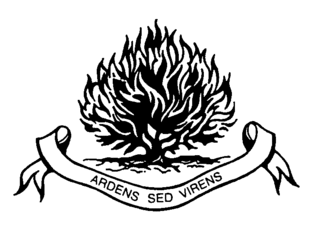
Presbyterianism is a part of the Reformed tradition within Protestantism that traces its origin to the Church of Scotland.

Scotland is a country that is part of the United Kingdom. Covering the northern third of the island of Great Britain, mainland Scotland has a 96-mile (154 km) border with England to the southeast and is otherwise surrounded by the Atlantic Ocean to the north and west, the North Sea to the northeast and the Irish Sea to the south. The country also contains more than 790 islands, principally in the archipelagos of the Hebrides and the Northern Isles. Most of the population, including the capital Edinburgh, is concentrated in the Central Belt – the plain between the Scottish Highlands and the Southern Uplands – in the Scottish Lowlands.
Robert Baillie was a Church of Scotland minister who became famous as an author and a propagandist for the Covenanters.

John Frederick Denison Maurice, known as F. D. Maurice, was an English Anglican theologian, a prolific author, and one of the founders of Christian socialism. Since World War II, interest in Maurice has expanded.
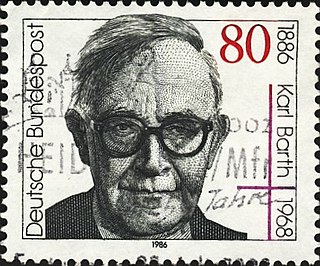
Karl Barth was a Swiss Calvinist theologian. Barth is well-known in theology for his landmark commentary The Epistle to the Romans (1921), his involvement in the Confessing Church, including his authorship of the Barmen Declaration, and especially his unfinished multi-volume theological summa the Church Dogmatics. Barth's influence expanded well beyond the academic realm to mainstream culture, leading him to be featured on the cover of Time on 20 April 1962.
The Scottish Episcopal Church is the ecclesiastical province of the Anglican Communion in Scotland.
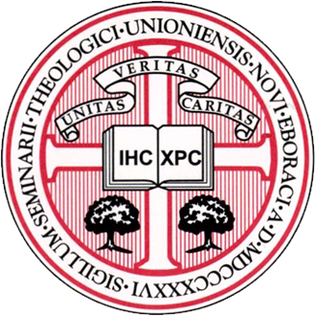
Union Theological Seminary in the City of New York (UTS) is a non-denominational Christian seminary in Morningside Heights, Manhattan, New York City. It is affiliated with neighboring Columbia University. Since 1928, the seminary has served as Columbia's constituent faculty of theology. In 1964, UTS also established an affiliation with the neighboring Jewish Theological Seminary of America.

The American Theological Library Association (Atla) is a nonprofit, 501(c)(3), professional association, headquartered in Chicago, Illinois, United States. Atla's member libraries and librarians provide resources for scholarly research to tens of thousands of students, faculty, staff, and administrators. The association supports the membership with services and products, including an annual conference, members-only publications and discounts, and professional development opportunities.

The Society for Promoting Christian Knowledge (SPCK) is a UK-based Christian charity. Founded in 1698 by Thomas Bray, it has worked for over 300 years to increase awareness of the Christian faith in the UK and across the world.
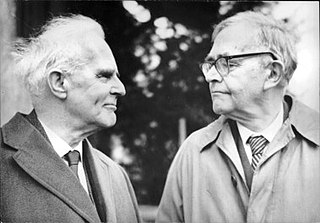
Heinrich Emil Brunner (1889–1966) was a Swiss Reformed theologian. Along with Karl Barth, he is commonly associated with neo-orthodoxy or the dialectical theology movement.
John Anthony McGuckin is a British theologian, church historian, Orthodox Christian priest and poet.
Decisions concerning the conduct of public worship in the Church of Scotland are entirely at the discretion of the parish minister. As a result, a wide variety of musical resources are used. However, at various times in its history, the General Assembly has commissioned volumes of psalms and hymns for use by congregations.
The Licentiate in Theology or Licence in Theology is a non-degree qualification in theology awarded in Canada and previously awarded in the United Kingdom, Australia, and New Zealand.
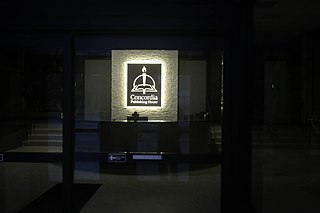
Concordia Publishing House (CPH), founded in 1869, is the official publishing arm of the Lutheran Church–Missouri Synod (LCMS). Headquartered in St Louis, Missouri, at 3558 S. Jefferson Avenue, CPH publishes the synod's official monthly magazine, The Lutheran Witness, and the synod's hymnals, including The Lutheran Hymnal (1941), Lutheran Worship (1982), and Lutheran Service Book (2006). It publishes a wide range of resources for churches, schools, and homes and is the publisher of the world's most widely circulated daily devotional resource, Portals of Prayer. Its children's books, known as Arch Books, have been published in millions of copies. Concordia Publishing House is the oldest publishing company west of the Mississippi River and the world's largest distinctly Lutheran publishing house.
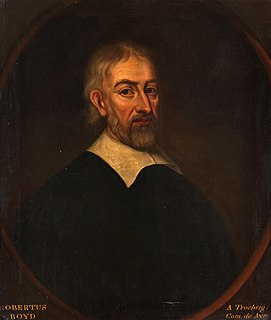
Robert Boyd of Trochrig (1578–1627) was a Scottish theological writer, teacher and poet. He studied at the University of Edinburgh and after attending lectures by Robert Rollock, prosecuted his studies in France, and became a minister in the French Church. All accounts represent him as a most accomplished scholar. A friend said of him, with perhaps some exaggeration, that he was more eloquent in French than in his native tongue; and Livingstone tells us that he spoke Latin with perfect fluency, but that he had heard him say, if he had his choice, he would rather express himself in Greek than in any other language. The Church of Boyd's adoption, which had given Andrew Melville a chair in one university, and Sharp a chair in another, was not slow to do honour to their brilliant countryman. He was made a professor in the protestant Academy of Saumur; and there for some years he taught theology. He was persuaded, however, in 1614 to come home and accept the Principalship of the Glasgow University. Though he was far from extreme in his Presbyterianism, he was found to be less tractable than the king and his advisers expected, and was obliged to resign his office. But he was long enough in Glasgow to leave the impress of himself on some of the young men destined to distinction in the Church in after years.
Kuzhivelil Varkey Mathew is an Indian biblical scholar and a member of the Society for Biblical Studies in India.
Robert Letham is Professor of Systematic and Historical Theology at the Union School of Theology. He is also Adjunct Professor of Systematic Theology at Westminster Theological Seminary.

Brian Brock is a Scottish/American theologian. He holds a Personal Chair in Christian Ethics at the School of Divinity, History, and Philosophy, University of Aberdeen.
Clair Linzey is a British theologian, animal ethicist and writer. She is the Frances Power Cobbe Professor of Animal Theology at the Graduate Theological Foundation, Deputy Director of the Oxford Centre for Animal Ethics and the director of their annual summer school. Linzey is also co-editor of the Palgrave Macmillan Animal Ethics Series and the Journal of Animal Ethics.
James Durham was the eldest son of John Durham of Easter Powrie, north of Dundee. He was educated at University of St Andrews, and betook himself to the life of a country gentleman. While visiting his mother-in-law in the parish of Abercorn, he came under profound religious impressions in consequence of a sermon by Melvill, minister of Queensferry. Joining in the Civil War, he was promoted captain, and seriously exhorted and led the devotions of his company; this being noticed by Professor Dickson, he was induced to prepare himself for the ministry, a resolution which was hastened by two narrow escapes on the battlefield. He graduated M.A.. He was licensed for the ministry by the Presbytery of Irvine 18 May 1647. He was admitted to the congregation of Blackfriars 2 December 1647. Durham was appointed chaplain to the King July 1650. He called 4 September 1651, with charge of West Quarter of the city. He endeavoured, without success, to effect a union between the two contending parties in the Church in 1652. He died of consumption, 25 June 1658.